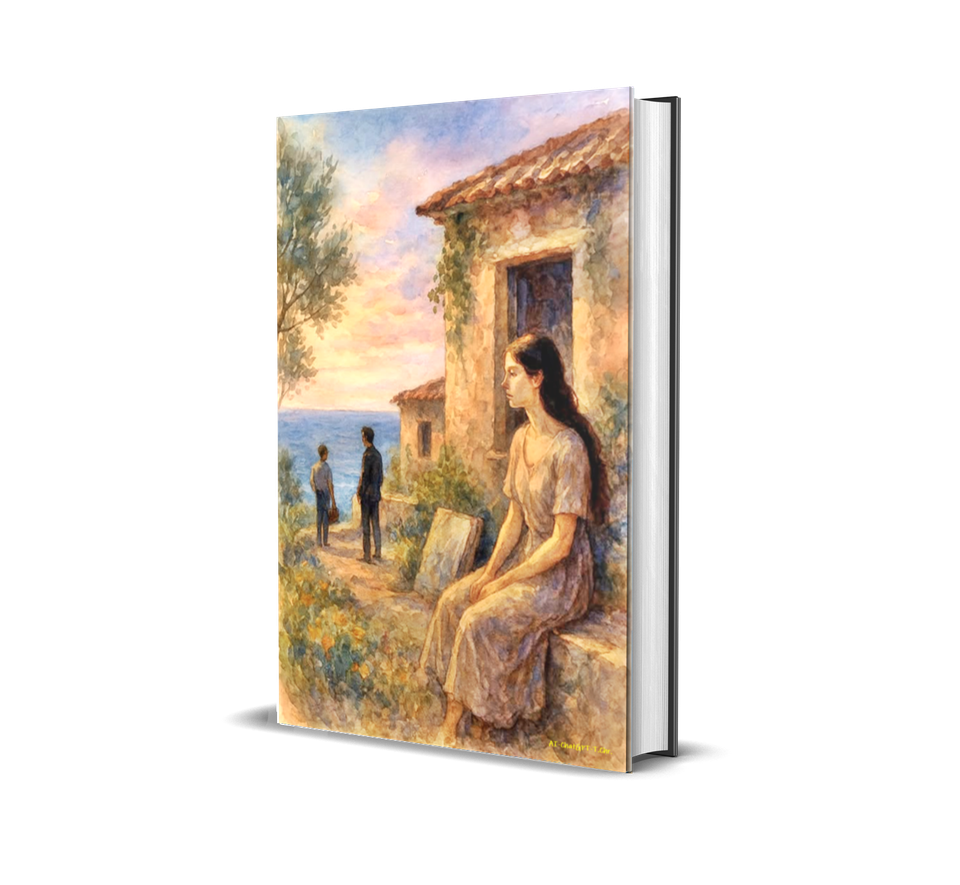WHISPERS IN THE GOLDEN HOUR

By AI-ChatGPT-.T.Chr.-Human Synthesis-12 August 2025
Elena arrived in Mirabelle with a suitcase full of silk scarves and a heart full of unspoken dreams. She was a painter—restless and searching, craving a place where the light was honest and the air carried stories. The villa she rented was an aging beauty perched on the edge of a sun-bleached hill, its walls cracked and ivy-clad, with wide windows that drank in the endless sky.
At first, the days stretched slow and sweet, like the honeyed afternoons of childhood memories. She wandered through vineyards and lemon groves, capturing flickers of light on canvas, her brushes tracing the fragile dance of shadow and sun. The town’s glittering elite passed through Mirabelle like phantoms: gowns flowing like water, laughter tinkling like crystal—but always with an edge, a tension beneath the veneer of ease.
And then she met Gabriel.
He was magnetic, the kind of man whose smile could both warm and wound, a novelist whose words had built worlds far richer than his own. Gabriel moved through the villa like a restless tide, his charm a mask for the storms beneath. His eyes held a weariness that Elena recognized—the weight of stories never fully told, of love that both healed and hurt.
Their days together shimmered with possibility—long talks by the sea, stolen kisses in the shadow of olive trees, evenings drenched in wine and laughter that sometimes cracked, spilling a truth too raw to hide. Gabriel’s past clung to him like salt on the skin, a faded love tangled with loss, memories that pulled him beneath the surface like undertows.
Elena painted him into her canvases, capturing the man who seemed both fierce and fragile, bright and broken. She felt herself unraveling, thread by delicate thread, caught in the pull of a love that dazzled but burned.
The villa’s walls listened to their whispered confessions and silences alike, holding their fragile moments suspended in the golden hour—the time when the world seemed to pause, caught between day and night.
But then, like a sudden breeze stirring the leaves, came Adrien.
He arrived in Mirabelle with the scent of rain and distant places—a jazz pianist from Paris, restless and enigmatic, with eyes that seemed to hold both mischief and melancholy. Adrien carried an air of effortless confidence, his laughter rolling like velvet over the sun-dappled terraces. His music filled the evenings with smoky notes, and his presence was a fresh spark in the village’s languid rhythm.
Adrien was different from Gabriel—wild, unpredictable, and unapologetically alive. He moved through Mirabelle with the ease of a man who lived for the moment, for the thrill of chance encounters and the promise of new beginnings.
Elena found herself drawn to Adrien’s irrepressible energy, his reckless charm a balm to the heaviness that had settled over her heart. Between Gabriel’s quiet despair and Adrien’s fiery spirit, she was caught in a delicate dance—one that thrilled and terrified her in equal measure.
As days bled into nights, tensions simmered beneath the villa’s sun-bleached stones. Gabriel’s shadows deepened, and Adrien’s laughter grew louder, each man pulling Elena in different directions—one toward the comfort of broken truths, the other toward the intoxicating promise of escape.
The three of them became a fragile triangle, their interactions a web of longing, jealousy, and unspoken fears. Elena’s canvases grew darker, the vibrant colors of summer giving way to hues of storm and twilight.
One evening, beneath a sky smeared with pink and violet, a confrontation broke the fragile peace. Words were said—sharp, aching, and honest—and the villa trembled with the weight of their unraveling.
Gabriel confessed the truth he’d been hiding—a past scar that threatened to undo them all. Adrien, with a bitter smile, revealed his own wounds, the ghosts that danced in his music’s shadows.
Elena stood between them, feeling the delicate threads of her own heart stretch to breaking. She realized that love, like the sea below the cliffs, was beautiful and terrifying—capable of lifting her to the sunlit heights or dragging her into the depths.
Elena’s Story
Elena’s earliest memories were painted with the soft hues of a sleepy coastal town where the sky met the sea in endless blue. Raised by her mother, a devoted schoolteacher with gentle hands and an iron will, Elena learned early to find beauty in small things—the way morning light filtered through lace curtains, the delicate curve of a seashell, the quiet rhythm of waves against the shore.
Art was Elena’s refuge. From childhood, she carried a sketchbook everywhere, capturing fleeting moments that others overlooked. Her mother encouraged her, but also warned her about chasing dreams too far, fearing the instability that often shadowed creative lives. So Elena balanced her longing for adventure with a practical heart, studying fine arts in a bustling European city far from home.
Those years were a mixture of wonder and loneliness. The city was alive and intoxicating, but Elena often felt like a ghost passing through crowded streets, her true self hidden beneath layers of expectation and uncertainty. She met artists and lovers, tasted freedom and loss, but the sense of belonging she craved remained elusive.
When her first serious relationship crumbled under the weight of unspoken doubts, Elena realized she was still searching—not just for love, but for herself. She needed a place where light was honest, where the air was clear enough to breathe deeply and listen to her own heartbeat.
Mirabelle was that place. The villa on the sun-bleached hill promised silence and space, a canvas for new beginnings. Here, Elena could paint not only what she saw but what she felt—capturing the fragile dance between shadow and sun that mirrored her own soul.
Meeting Gabriel was like finding a mirror, reflecting both the beauty and the scars she carried. His charm and intellect drew her in, but the sadness beneath his surface warned her of the delicate balance between holding on and letting go.
Then Adrien came—a wild, unpredictable flame that threatened to burn away the shadows, if only for a moment. With him, Elena tasted the exhilarating risk of surrender, the messy, thrilling chaos of being fully alive.
Caught between these two men, Elena’s art deepened. Her canvases grew richer with color and emotion, revealing the complexities of desire, loss, and hope. She painted love not as a perfect idyll but as a fragile, fierce force that could uplift and unravel.
Through it all, Elena discovered that her true journey wasn’t about choosing between love or safety, past or future. It was about embracing the whole—light and shadow, joy and pain—and learning to stand steady amid the shifting tides of the heart.
The Choice
The late afternoon sun filtered through the olive branches, casting shifting patterns on Elena’s studio floor. She stood before a half-finished canvas, the colors vibrant but restless, like the turmoil inside her.
Outside, laughter and music drifted up from the villa’s terrace. Gabriel and Adrien were there—two lives intertwined with hers, two futures pulling her in different directions.
Her brush hovered uncertainly.
Gabriel’s steady gaze had once promised understanding and quiet depth—a refuge from the chaos of her thoughts. But lately, his silence felt heavy, as if he was slowly slipping beneath a tide she couldn’t reach.
Adrien’s laughter was a wild, urgent thing, filled with light and danger both. With him, she could escape the shadows, dive into the unknown, and rediscover the fierce freedom she sometimes feared she’d lost.
Elena’s heart ached, torn between the calm and the storm.
She stepped back from the canvas and closed her eyes.
What did she truly want? Stability or passion? Comfort or risk? To hold on or to let go?
A soft breeze stirred the curtains, and with it came the scent of salt and jasmine—the scent of Mirabelle itself, timeless and unyielding.
Her choice was not just between two men, but between parts of herself she had yet to reconcile.
Elena took a deep breath, feeling the weight of the moment settle into a quiet clarity.
She would follow the path that called to her soul, even if it meant walking into the unknown—because some stories, like paintings, required courage to be completed.
With renewed purpose, Elena lifted her brush and returned to the canvas, ready to paint the next chapter of her life in bold, unflinching strokes.
Closing
The golden light softened into dusk, spilling a quiet grace across the villa’s worn stones. Elena sat by the window, her latest canvas leaning against the wall—an unfinished symphony of color and shadow, much like the summer she had lived through.
Gabriel had drifted away with the coming of cooler winds, carrying his ghosts and leaving behind a bittersweet silence. Adrien had vanished as mysteriously as he had appeared, his music lingering like a fading echo in the night air.
Alone now, Elena felt the weight and wonder of all she had loved and lost—how each moment of joy and pain had carved new depth into her soul.
She knew that life, much like art, was never a perfect picture. It was a delicate balance of light and darkness, clarity and mystery, beauty and imperfection.
In Mirabelle, beneath ever-changing skies, Elena had discovered that to create—to truly live—was to embrace this complexity without fear.
Her brush moved slowly across the canvas, each stroke a whisper of hope, a quiet testament to resilience.
And as the stars began to pierce the twilight, Elena felt something shift inside—a gentle knowing that the stories we carry are not just ours alone, but threads woven into the vast, shimmering tapestry of human experience.
Philosophical Overview
Elena’s journey through Mirabelle is more than a tale of love and longing; it is a meditation on the fragile, beautiful contradictions at the heart of being human.
Love, in its purest form, is not simply an emotion or a state of bliss. It is a force that demands courage — courage to face another’s light and darkness, to hold tenderness alongside pain, to embrace impermanence without losing hope. Elena’s relationships with Gabriel and Adrien reveal that love is rarely neat or easy. It is a constant negotiation between desire and fear, connection and freedom, stability and change.
Loss, too, is not merely an end but a transformation. The echoes of what once was shape the contours of what is to come. Like Elena’s paintings—never fully finished—our lives are works in progress, enriched by scars as much as by joys.
Creativity becomes both refuge and revelation. Through art, Elena learns to translate her inner turmoil into something tangible, something that invites others to witness the complexity of her experience. Her canvas is a mirror reflecting the paradoxes of life: the intertwining of light and shadow, the tension between beauty and decay.
Ultimately, Elena’s story reminds us that human existence is a dance on the edge of uncertainty. To live fully is to accept the impermanence of all things, to find meaning not in perfection but in the willingness to embrace life’s messiness and mystery.
In the golden hour between day and night—the time when the world holds its breath—there lies a profound truth: that the softest nights can leave the sharpest wounds, yet from these wounds, the deepest art and the truest love are born.
